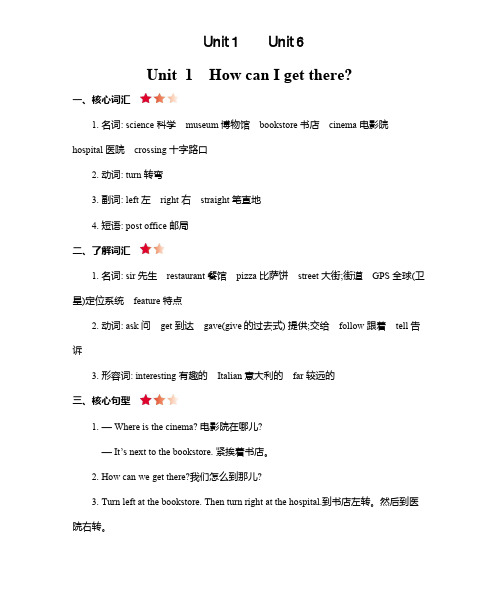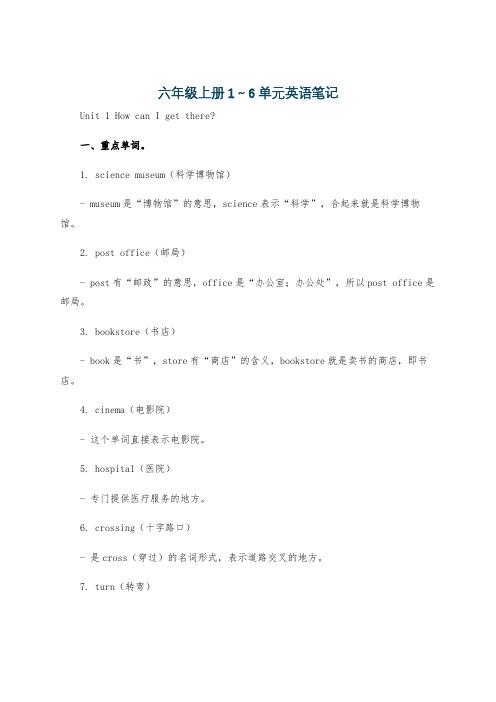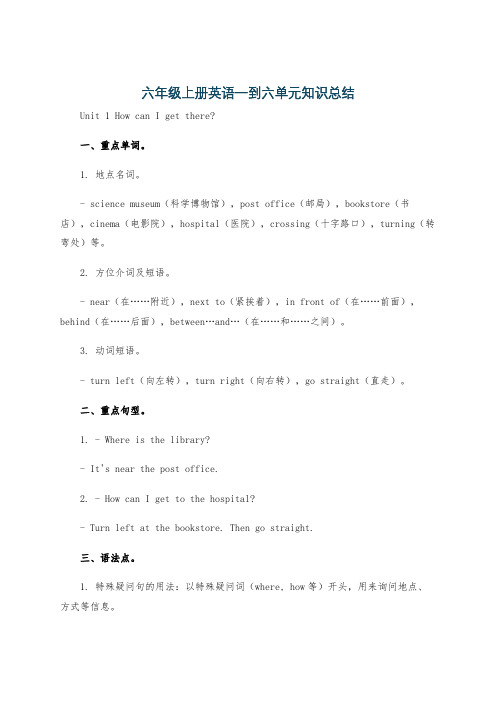小学英语第六册1-6单元复习
新版PEP小学英语六年级上册1-6单元知识点总结

六年级PEP 上册4-6知识总结Unit 4 I have a pen pal知识点归纳:一.本单元主要是谈论某人的兴趣爱好。
二.语法是动词的-ing 形式和动词的第三人称单数形式。
三. 词汇: dance (dancing) 跳舞 sing (singing ) 唱歌hobby play football (playing football) 踢足球(爱好) read story (reading stories ) 看故事do kung fu (doting kung fu ) 练武术live (lives) 居住,住 like (likes) 喜欢 teach (teaches) 教 study ( studies Chinese 学习汉语)go (goes) 去 goes hiking 去远足第三人单数 watch (watches TV) 看电视read (reads) 读 cook (cooks Chinese food 制作中国食物)do (does) does word puzzles 玩字谜四.句型:1. 询问某人的爱好:----What’s your hobby? 你的爱好是什么?I like reading stories and singing. 我喜欢集邮2. 表示征求别人意见:what about you ? 你呢?Me too. 我也是。
Let’s go together. 让我们一起去吧。
五.语法:一般现在时的用法(1) 表示经常或习惯性的动作或状态,常与every day /morning /evening ,often,usually ,always 等状语连用。
如: We do morning exercises every day. He usually goes to school by bike.结构:肯定句:主语+动词+其他。
如: Miss white teaches English.否定句:主语+don ’t/doesn ’t +动词+其他 Miss white doesn ’t teach English.一般疑问句:Do/ Does +主语+ 动词原形+其他? 如: Does Miss White teach English?肯否定回答:Yes ,she does ./ No, she doesn’t .备注:第一人称单数用does, doesn ’t 没有does doesn ’t 是 动词必须要有变化。
六年级英语Unit1——Unit6知识点汇总

六年级英语Unit1——Unit6知识点汇总Unit1How can I get there?一、核心词汇1.名词:science科学museum博物馆bookstore书店cinema电影院hospital医院crossing十字路口2.动词:turn转弯3.副词:left左right右straight笔直地4.短语:post office邮局二、了解词汇1.名词:sir先生restaurant餐馆pizza比萨饼street大街;街道GPS全球(卫星)定位系统feature特点2.动词:ask问get到达gave(give的过去式)提供;交给follow跟着tell告诉3.形容词:interesting有趣的Italian意大利的far较远的三、核心句型1.—Where is the cinema?电影院在哪儿?—It’s next to the bookstore.紧挨着书店。
2.How can we get there?我们怎么到那儿?3.Turn left at the bookstore.Then turn right at the hospital.到书店左转。
然后到医院右转。
注意:要注意介词的固定搭配。
Turn left/right at the…到……左/右转。
Get off at the…在……下车。
It’s on the left/right.在左/右边。
Walk/Go straight for…minutes.步行/直走……分钟。
It’s east/west/south/north of the…在……东/西/南/北边。
It’s far from the…距离……远。
四、了解句型1.Is there a…?……有……吗?拓展:there be句型(1)主要用以表达“某处(某时)有某人(某物)”,其基本句型为“There+be动词+名词+介词短语+其他.”There is a football under the chair.椅子下面有一个足球。
2022新版PEP小学英语六年级上册1-6单元知识点总结

Unit1HowcanIgettherea电影院boostore书店sciencemuseum科学博物馆crossing十字路口su etoschool你怎样去/来上学—UsuallyIgo/cometoschool onfoot通常我走路去/来上学。
—Howdoeshe/she/etoschool他/她/皮特怎样去/来上学—He/Sheusuallygoes/comestoschoolbybie他/她通常骑自行车去/来上—How doesyourfathergotowor你父亲怎样去上班—He goestoworbysubway他坐地铁去上班。
②询问地点,用疑问代词whereWhereisyourhome你家在哪里It’snearthe icboo 漫画书wordboo单词书dictionary字典icboosaboutsawilltellusastoryaboutChang’eWhatareyougoingtobeWhatdoyouwanttobeI’Unit4Ihaveamingandorning/evening,often,usual ly,always等状语连用。
如:结构:肯定句:主语动词原形或者单三式动词其他。
如:否定句:主语don’t/doesn’t动词原形其他Idon’’tteachEnglish一般疑问句:Do/Does主语动词原形其他如:DoyouteachEnglishDoesMissWhiteteachEnglish肯否定回答:Yes,Ido/No,I don’,,shedoesn’t六.课文中的重点语句:Helivesonafarm,’mgoingtoteachhimtheChinesesong”JasmineFlo wer”I’mwritinganemailtomynewaerobotsWhodoesthedishesWhoteachesmathWhocoosnoodles Unit5Whatdoeshedo一、知识点归纳(一)词汇四会singer歌手writer作家HongKong香港headteacher校长dancer舞蹈家sea大海worer工人cleaner清洁工factory工厂an邮递员driver司机stay保持businessman商人secretary秘书university大学TVre an渔民money 金钱scientist科学家gym体育馆astudent我是一个学生。
六年级上册1~6单元英语笔记

六年级上册1~6单元英语笔记Unit 1 How can I get there?一、重点单词。
1. science museum(科学博物馆)- museum是“博物馆”的意思,science表示“科学”,合起来就是科学博物馆。
2. post office(邮局)- post有“邮政”的意思,office是“办公室;办公处”,所以post office是邮局。
3. bookstore(书店)- book是“书”,store有“商店”的含义,bookstore就是卖书的商店,即书店。
4. cinema(电影院)- 这个单词直接表示电影院。
5. hospital(医院)- 专门提供医疗服务的地方。
6. crossing(十字路口)- 是cross(穿过)的名词形式,表示道路交叉的地方。
7. turn(转弯)- 既可以作动词,如turn left(向左转),turn right(向右转);也可以作名词。
二、重点短语。
1. near(在……附近)- 例如:The post office is near the bookstore.(邮局在书店附近。
)2. next to(紧挨着;与……相邻)- My home is next to the cinema.(我的家紧挨着电影院。
)3. in front of(在……前面)- There is a tree in front of my house.(我家前面有一棵树。
注意:in front of是在物体外部的前面,而in the front of是在物体内部的前面,如There is a blackboard in the front of the classroom.教室里前面有一块黑板。
)4. behind(在……后面)- The cat is behind the box.(猫在盒子后面。
)5. go straight(直走)- Go straight and you can see the hospital.(直走你就能看到医院。
PEP小学英语六年级1-6单元总复习课件

Unit 4
• • • • • • • • • hobby(爱好) ride --riding a bike(骑自行车) dive--diving(跳水) play —playing the violin(拉小提琴) make—making kites(制作风筝) collect—collecting stamps(集邮) live –lives(居住) teach--teaches(教) go--goes(去) watch--watches(看) read--reads(读,看)
1/6/2014
LOGO
LOGO
Unit 2
library(图书馆) post office(邮局) hospital(医院) cinema(电影院) bookstore(书店) science museum科学博物 馆 supermarket超级市场 bank 银 行 excuse me 对不起 where(在哪里, 到哪里) please(请) next to(与…相 邻) turn right (向右转) turn left(向 左转) go straight(笔直走) north 北 south 南 east 东 west 西 then (然后)
LOGO
1/6/2014
LOGO
10.—What’s your hobby? • 你的爱好是什么? • --I like collecting stamps. He likes collecting stamps, too.我喜欢集邮。 他也喜欢集邮。 • 11.—Does she teach English? • 她是教英语的吗? • --No, she doesn’t. /Yes, she does. 丌,她 丌是。/是,她是的。
湘少版小学英语六上1-6总复习

湘少版小学英语六1-6总复习一、单词和词组Unit 1during 在……期间holiday 假日;假期learn words and sentences学习单词和句子play games玩游戏learn writing学习写作practise listening练习听力Unit 2weekday平日(除周末以外的日子)after在……之后before在……之前always总是;经常often常常;时常sometimes有时never从不wave goodbye挥手再见be late for school上学迟到read a newspaper读报纸play chess下棋take a walk散步get up起床have/has breakfast吃早餐return home回家Unit 3world世界email my friends给朋友们发电子邮件send greetings送去问候search for a lot of things查找许多东西find out about countries查找国家的信息Unit 4the Mid-Autumn Festival中秋节nearby附近的type类型taste尝nuts坚果go shopping去购物shopping centre购物中心have a look看一看louts seed莲子red bean红豆Unit 5clear 晴朗的weather forecast天气预报light rain小雨heavy rain大雨sunny and warm晴朗而又暖和strong wind强风sunny and cool晴朗而又凉爽light snow小雪Unit 6a….of 如:a bottle of一瓶 a box of一盒 a few cans of几罐a few bars of几条 a piece of一张 a bowl of一碗 a cup of一杯二、句型Unit 1时态:一般过去时,表示过去某个时间发生的动作或存在的状态。
六年级上册英语一到六单元知识总结

六年级上册英语一到六单元知识总结Unit 1 How can I get there?一、重点单词。
1. 地点名词。
- science museum(科学博物馆),post office(邮局),bookstore(书店),cinema(电影院),hospital(医院),crossing(十字路口),turning(转弯处)等。
2. 方位介词及短语。
- near(在……附近),next to(紧挨着),in front of(在……前面),behind(在……后面),between…and…(在……和……之间)。
3. 动词短语。
- turn left(向左转),turn right(向右转),go straight(直走)。
二、重点句型。
1. - Where is the library?- It's near the post office.2. - How can I get to the hospital?- Turn left at the bookstore. Then go straight.三、语法点。
1. 特殊疑问句的用法:以特殊疑问词(where, how等)开头,用来询问地点、方式等信息。
2. 一般现在时在问路指路中的运用。
Unit 2 Ways to go to school.一、重点单词。
1. 交通工具名词。
- by bike(骑自行车),by bus(乘公共汽车),by train(乘火车),by plane(乘飞机),on foot(步行),ship(轮船),subway(地铁)等。
2. 形容词。
- slow(慢的),fast(快的)。
3. 其他。
- traffic(交通),traffic lights(交通灯),stop(停),wait(等)。
二、重点句型。
1. - How do you come to school?- Usually, I come on foot.2. - How can I get to the Fuxing Hospital?- Take the No. 57 bus over there.三、语法点。
六年级上册英语一到六单元知识点

六年级上册英语一到六单元知识点在六年级上册的英语教学中,一到六单元涵盖了丰富的知识点,包括单词、短语、语法和阅读理解等内容。
本文将从单词、短语、语法和阅读理解四个方面深入探讨这些知识点,并对每个单元进行全面评估和总结。
一单元主要包括了数字、问候语、自我介绍以及一些简单的日常用语。
在这个单元中,我们学习了基础的英语口语表达,如“Hello, what's your name?”、“My name is…”等。
我们还掌握了一些基本的数字词汇和颜色词汇,比如“one, two, three, red, blue, yellow”等。
这些内容为我们日常生活中的交流奠定了基础。
二单元开始进入了家庭和职业领域的词汇学习。
我们学习了家庭成员的称呼,如“father, mother, brother, sister”等,同时也学习了一些常见的职业名称,比如“doctor, teacher, nurse, farmer”等。
这些词汇的学习让我们对周围的人和事有了更清晰的认识。
三单元扩展了我们的日常生活话题,包括了购物、食物和饮料的词汇。
我们学习了一些水果蔬菜的名称,如“apple, banana, tomato, carrot”等,也学习了购物时常用的一些句型,比如“How much is it?”、“I'd like…”等。
这些内容为我们提供了日常生活中的应用场景,让我们能够更流利地进行交流。
四单元引入了一些日常活动、时间和天气方面的词汇。
我们学习了如何描述不同的天气状况,比如“fine, rainy, cloudy”等,也学习了如何询问时间和安排日常活动,比如“What's the time?”、“Whatdo you do on weekends?”等。
这些内容丰富了我们的词汇量,并为我们提供了更多的话题内容进行交流。
五单元开始对一些动作和能力进行学习,包括了一些动词和形容词的用法。
- 1、下载文档前请自行甄别文档内容的完整性,平台不提供额外的编辑、内容补充、找答案等附加服务。
- 2、"仅部分预览"的文档,不可在线预览部分如存在完整性等问题,可反馈申请退款(可完整预览的文档不适用该条件!)。
- 3、如文档侵犯您的权益,请联系客服反馈,我们会尽快为您处理(人工客服工作时间:9:00-18:30)。
一.按要求写单词:1. kind(同义词)2.loud(反义词)3. these(单数)4.he (对应词)5.I(宾格)6.help (形容词)7.people(复数)8.bad(对应词)9.write(名词) 10.sing(名词) 11.run (名词) 12.child(复数) 13.擅长14.努力工作15.在班上16.跑得快17.努力尝试18.tall(近义词) 19.long(反义词) 20.有点吵21.在乡下22.去超市23.拜访祖父母24.本周末25.在周末26. toy复数27.在家28.在班上29.和…讲话30.loud反义词31.sad反义词32.try三单33.one序数词34.two基数词二.改错:1.I’m going to helping her.2.This little girl are sad.3.It’s a old clock.4.I want visit London.5.You are see a wide river.6. Xiaoyong want to fly.7. You will be a drive.8. What will you are?9. I are bad children.10. He work hard at Science.11. We’ve got Lingling report.12. What do the report say?13. Is Daming naughty at class?14. She’s quiet good at English.15. He’ll be a astronaut.16.These are my friend!17. The little boy can’t do her English.18. I will see lot of pigs.19.She always go swimming.20. The people on the Eye says,“Look at that.”21. He will to see an old clock.22. Sam wants to visit the Tower Bridge.23. Come the police station with me now.24. My little sister loves book.25. What are you be?26. I want pick many bananas.27. Let me washing the dress.28. When I look at it’s face, I’m happy.29. She is happy to her work.30. What do it say?31. When I look its face, I laugh.32. Here is her favourite tangerines.33. He can makes e-cards.34. Lily is nice and shy.35. Write a word at a piece of paper.36. What are you be in the future?37. Are your mother a nurse?38. Will we pick pear?39. They didn’t got oranges.40. Which other fruit will we pick?41. Let’s counts them!42. I was on China.三.句型转换:1. Will you phone me?(否定回答)2. There is a phone there.(否定句)3. I won’t go to school.(肯定句)4. I will play with my friend.(对划线部分提问)5. It’s my pencil-box. (对划线部分提问)6. I’ll go to school this weekend. (对划线部分提问)7. John lives in London. (对划线部分提问)8. This little girl is a bit quiet. (对划线部分提问)9. I’m watching TV at home . (对划线部分提问)10. It is a loud bird. (对划线部分提问)11. Xiaoyong is a bit quiet. (对划线部分提问)12. She tries hard in the school.(变一般疑问句)13. Twelve plus five is seventeen. (对划线部分提问)14. We’ll go to the zoo this weekend. (变一般疑问句)四.选择:1. There _______some fruit in the box. A. is B. are2. There _______many apples on the tree. A. is B. are3. Let’s count_________. A. they B. their C. them4. His favourite fruit ________ pears. A. are B. is5. Fangfang is happy _________her Chinese. A. to B. with C. in6. It’s ___________ Day today. A. Parents B. Parents’ C. Parent’s7. She _______work hard. A. don’t B. doesn’t C. isn’t8. I’ve got two books _______ Shanghai. A. in B. about C. at9. Is Daming quiet ________class? A. on B. in C. for10. The report ________ he’s very helpful. A. says B. say C. to say11. Try _______the word. A. remember B. to remember C. remembers.12.You don’t work hard______ Science. A. to B. with C. at13.________ does your good friend live? A. What B. Where C. Who14. How clever girl _______! A. she is B. is she15. What’s Parrot like? A. He’s loud. B. He likes apples.16. What does Parrot like? A. He’s loud. B. He likes apples.17. What will you be?________ A. I will be a writer. B. I will study.18. What will you do?________ A. I will be a writer. B. I will study.19. What _____your sister do? She is a student. A. is B.does20. What _____your sister? She is a student. A. is B.does21. Jim _______fly a plane in the future. A. wants B. doesn’t C. won’t22. That’s ________I’ll see. A. is B. what C. are23. My favourite fruit ________ apples. A. is B. are24. Apples ________ my favourite fruit. A. is B. are25. We are _________ the first floor. A. at B. in C. on26. We are on the _____ floor. A. two B. second C.one27. I was ________ Daming at Daming’s flat yesterday. A.or B. and C.with28. I with Daming ________ at Daming’s flat yesterday. A. was B. were C. am29. I and Daming ________ at Daming’s flat yesterday. A. was B. were C. Is五.用适当形式填空:1. My little brother wants________(see) the Ming Tombs.2. You are ________(go) to the cinema today.3. The little girl ________(live) in Tianjin.4. I will see ______(lot) of elephants and ducks.5. She will see some boys _________(play) with toys.6. He will visit ________(he) friend today.7. Her good friend ________(help) do her Maths.8. They want _________(look) at his face.9. What _______(do) it say?10. They _____young then. Now they_____old.(be)11. Here _______(is) my favourite dolls.12. I want to look at _________(it) face.13. I am from _________, I ’m a ___________ girl. (China)。
